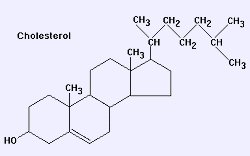When most people try and gain weight, they are aware of the need for high fat products to assist in reaching their goal. There is no problem with having a bit of fat in your diet, but this does become a problem when fatty foods make up a large part of your dietary intake. Such choices can raise your cholesterol levels and could lead to the development of fatty deposits that can cause heart attacks, strokes, and heart disease: conditions that can kill.<br /> <br /> But first, what is cholesterol and how can you control it? Let’s start by learning something about it.<br /><br />
What is cholesterol?

Did you know that there are two types of cholesterol? There's what’s often called "good" cholesterol (HDL or high density lipoproteins) that occurs naturally in the blood and helps dispose of "bad" cholesterol (LDL or low density lipoproteins), which is the type that can clog arteries and lead to heart attacks and strokes.<br /><br />
When you eat too much saturated fat (like in greasy food), the levels of bad cholesterol rise and there is not enough good cholesterol to balance it out and keep your levels normal. But it isn’t the end of the world.<br />
<br />
The main problem with high cholesterol levels is that there's no way of knowing if they're too high unless you have them checked with your doctor. I would strongly recommend this before you start gaining because there are other factors to consider.<br />
Genetics

Genetics play an important role in your cholesterol levels, because they decide how quickly the bad cholesterol is absorbed into your body and whether you're at risk of developing early heart disease. Generally speaking, if your parents have or had high cholesterol, it may be an issue for you, too. Conversely, there are people who can eat more or less as they like, without serious consequences to their blood cholesterol levels.<br /><br />
Dietary intake

What you eat will play a defining part in whether your cholesterol levels will be normal. Eating low fat meals for instance, like lean meat or grilled fish will be beneficial. The omega 3 in the fish is very very good for you and apparently helps boost brain function. Avocados, olives, seeds or even nuts are also a good investment. Using poly and mono-unsaturated fats, like cooking oils or margarines on your food is also good.<br /><br />





